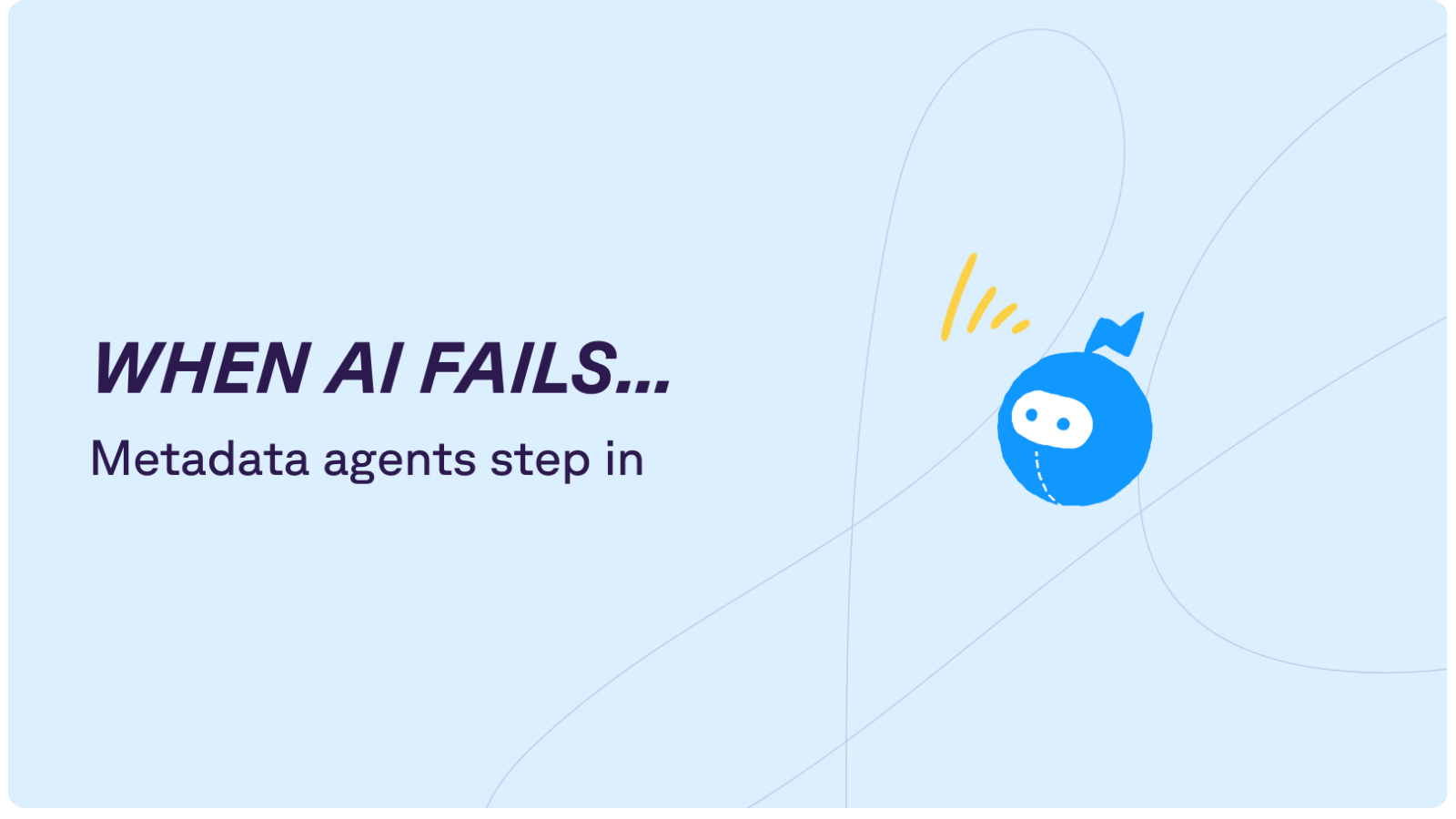At Fortune’s Brainstorm Tech conference this September, Salesforce did something you don’t see very often: they actually admitted their AI messed up.
A customer-facing agent had to be shut down because it was hallucinating too much. The system wasn’t producing consistent answers. Customers got confused. Executives were getting... nervous.
If that’s where the AI story ended, it would just be another cautionary tale in the ever-increasing heap of “AI gone wrong” headlines. But when Salesforce dug deeper, they discovered something vital: the problem wasn’t the agent at all, it was the data doing the damage.
As it turns out, contradictory knowledge articles on Salesforce’s own site had sent the model into a tailspin.
The hallucinations were just the symptom. The cause? A simple case of capital-I Inconsistency.
Thankfully, Salesforce didn’t abandon the project. They reframed it. The same AI agent was repurposed as an auditor agent, scanning the company’s public knowledge base for contradictions. Once the anomalies were cleaned up, the agent went back online and started delivering actually consistent results.
What a revealing moment for the team at Salsforce. AI had forced the company to confront something that had always been true: their own data was messy.
Why 95% of AI Pilots Fail
Obviously, as anybody working in this field in the last three years knows, Salesforce isn’t alone.
According to MIT research, 95% of AI pilots at large corporations fail. Not because the models are weak-brained, but because the foundations they're built on are quite broken.
Ashok Srivastava, Intuit’s Chief AI Officer, put it bluntly: “The foundation of AI — which is data — people don’t invest in it. You’ve got 1990s data sitting in a super-expensive database, you’ve got AI here, you’ve got the CEO telling you to do something, and it’s just not going to work.”
The typical corporate AI journey goes like this:
- Leadership pushes for an AI pilot to “get ahead.”
- Teams launch something quickly, hoping to impress said leadership.
- The pilot produces a bunch of noise instead of true insight.
- Blame falls on the model, the vendor, or good old-fashioned “AI hype.”
Sean Bruich, Amgen’s SVP of AI and Data, added another layer to the lasagna. Your pilots might deliver inspiration or proof points, but inspiration doesn’t mean more revenue. “The path to scale — that is where you get the return on investment,” he said.
Fortune's cautionary tale wasn’t about hallucinations at all. It was about the difference between noise and context. And that’s where metadata comes in.
Why metadata matters for AI in Salesforce
Think of your Salesforce org like a big ol' city. The data are the buildings —the accounts, contacts, opportunities. But metadata is the zoning map, the street signs, the rules that define how the city works.
Without clear zoning, a city descends into chaos (just ask Charlotte, North Carolina) (I kid).
Without consistent metadata, Salesforce does precisely the same thing. Records contradict each other. Rules overlap. Processes break. To humans, this mess might be totally invisible, because we work around it. To AI, the mess is impossible to ignore.
Salesforce is, in many ways, already a living metadata model. Every field, object, and dependency is metadata describing how the system works. But the model is too vast for humans to manage manually. Even the best Salesforce teams can’t catch every contradiction or misalignment, or simulate every downstream effect.
That’s why metadata agents matter in this environment. They don’t just sit "on top of your data" as so many folks assume. They go deep underneath it, enforcing the context that makes AI outputs real and trustworthy.
How metadata agents turn failure into scale
The auditor agent Salesforce described was a prototype for what Sweep is building — and has been building — every day.
Our metadata agents don’t wait until something fails in production. They monitor continuously, surfacing those very contradictions as they pop up. Along with flagging risks, they analyze the downstream impact, showing you what a new rule or workflow will break before it actually breaks.
Need an example? Cool. Let's say you’re about to deploy a new assignment rule across opportunities. With Sweep a metadata agent runs the simulation and reveals that 12 accounts will suddenly end up unassigned, breaking revenue coverage in your biggest territory. Talk about a win.
Or imagine what if two teams quietly maintained different definitions of “customer.” A metadata agent won't wait until a board meeting exposes the reporting inconsistency, it'll flag the contradiction in real time, forcing the conversation before it costs you your credibility.
That’s how failures turn into visibility and visibility turns into scale.
The agentic workspace: Humans + metadata agents
At Sweep, we call this the agentic workspace for Salesforce, a living environment where human operators and metadata agents can collaborate.
We humans bring the intent, deciding the strategy, setting priorities, and determining what success looks like. Metadata agents bring visibility and control to make that actually happen. They enforce consistency, surface risks, and maintain alignment.
The result is complete operational clarity. And that clarity compounds. The more you build in Salesforce, the more your agents govern. Instead of complexity turning into drag, as it so often does, it becomes managed complexity — the type of complexity you can trust to build on more.
That’s the difference between pilots that fizzle out and AI that scales across the enterprise. (MIT, if you're reading this call us. We can hook you up.)
Why Metadata agents are urgent now
The Salesforce anecdote is a preview of what’s ahead for every enterprise under pressure to “do something with AI.”
AI shines a spotlight on messes. Pilots fail not because the technology is weak, but because their data is inconsistent. And when that happens, you have two choices:
- Dismiss the failure as proof AI doesn’t work, and retreat. (And most likely lose out to competition) or...
- Treat the failure as evidence of hidden fragility, and fix your foundation the right way.
It's no surprise that metadata agents are the mechanism for fixing that foundation. They don’t remove the need for strategy or leadership, but they create the conditions for AI to actually deliver ROI.
The Sweep advantage
This is why Sweep puts metadata agents at the center of our story.
With Sweep:
- Teams gain visibility. Contradictions are surfaced before they snowball into broken processes.
- AI gains context. Outputs move from noise to clarity.
- Enterprises gain scale. Governance becomes cyclical, so AI can be trusted at every layer of the business.
The lesson from Salesforce’s temporary embarrassment isn’t that AI can’t be trusted AT ALL. It’s that AI has revealed what we’ve ignored for years: our systems are more tenuously balanced than we'd care to admit.
Metadata agents are how you move from fragile to future-ready. They’re how you turn AI from an experiment into infrastructure. They’re how you get ROI — not someday, but today. TODAY!
So in the end, if you’re piloting AI in Salesforce, you’re either already feeling this pain, or about to. Don’t let your pilot become another statistic. Be the 5%.
🪄 Book a demo to see Sweep’s metadata agents in action. You'll be glad ya did)

